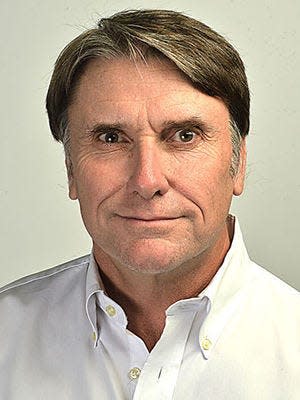Sam Bankman-Fried’s FTX isn't much different from the birth of Wall Street
Give them this: At an age when most of us were still shooting pool, listening to Merle on the jukebox and figuring out what we wanted to do with our lives, the kids at FTX were creating a multibillion-dollar financial empire.
So what if it was fabricated? Crypto was “mostly scams and memes when you get down to it,” wrote Caroline Ellison, 28, who ran the hedge fund side of Sam Bankman-Fried’s high-tech Ponzi scheme.
Ellison was a preacher who didn’t believe in God. But she did believe, apparently, that something would come of decentralized banking, it just wasn’t clear what. “If authoritarian governments are a serious threat to civilization, which seems not totally insane, it could end up being important,” she wrote.

It’s the old fake it ’til you make it strategy, and unfortunately for FTX, its founders got caught squarely in the “fake it” stage. Still, it wouldn’t surprise if one day the seeds of these crude financial experiments grow into something useful, even if they don’t resemble the crypto train wrecks of today that seem to be occurring on a monthly basis.
After all, 200 years ago, a similar economic instrument was as derided and abused as crypto is today. It became known as a “corporation.”
For a time, it seemed that President Andrew Jackson’s populists had won. Jacksonians were intent on destroying (sound familiar?) the handful of elite families that controlled, well, everything.
At the turn of the 19th century, this balderdash about all men being created equal was just so much lofty and impractical talk. At that time, a man of importance could still walk into his state legislature and demand an exclusive charter — monopoly status — for their quasi-public endeavors, such as a steamboat route or a turnpike.
This exclusivity began to break with help from the Supreme Court, particularly in the industrialized North, and the old guard watched in horror as a tsunami of uncouth commoners became fabulously wealthy without having been born into a privileged family with names like Livingston and Jay.
Economic development:Here's how the Main Street program helps downtown Hagerstown
It didn’t last. Once these uncouth commoners had become wealthy themselves, they looked for ways to fortify their own power against young Turks — just as the First Families had tried to do to them.
As with crypto, they came up with a mechanism no one could understand. A couple of partners would take the entire value of their business’s hard assets — machines, land, buildings — and divide it into $100 lots, represented by pieces of paper. These lots, or shares, could be sold to people who had never laid eyes on the business they now, in part, owned.
These shares were bought and sold at a small auction house on Wall Street, where a handful of insular traders passed stock back and forth among themselves, not unlike today’s purveyors of crypto. Small players trying to get in on the action routinely got hosed. Financiers such as Daniel Drew saw more opportunity in this business of paper than in the businesses that actually made things, and became masters at manipulating share prices and were not above counterfeiting paper should the need arise.
Jacksonians were outraged. Here they’d gone to the good time and trouble to strip power from the hands of a wealthy few, and now they were right back where they started.
To them, a corporation made no more sense than a blockchain. Taking a business out of the hands of a businessman and putting it into the hands of a faceless entity with no particular public face or anyone in the position of accountability struck them not just as crazy, but as counter to the principles of rugged, self-made individuality and inherently godless.
They saw businesses that were controlled not by a man but by a thing as ripe for abuse, and they seem to have gotten that part right. All sorts of shenanigans were playing out behind all that paper.
In a precursor of the lending tranches and credit default swaps that led to a global financial meltdown in 2008, 19th century financiers found they could buy and sell not just company shares, but hunches and predictions of where various markets were heading.
They concocted the idea of a short sale, a convoluted transaction that presages a company’s declining success, or as Drew explained it, "He who sells what isn't his'n, must buy it back or go to pris'n."
But things change. Today, those very same populists have facilitated a Supreme Court that believes a corporation has more fundamental rights than a person, and created a monetary system that has little practical use save for the drug dealers and money launderers.
Somewhere, Daniel Drew — who once fed salt to cattle so they would drink lots of water and weigh more at sale — is smiling.
Tim Rowland is a Herald-Mail columnist.
This article originally appeared on The Herald-Mail: FTX's Ponzi scheme, birth of the corporation, have a lot in common
